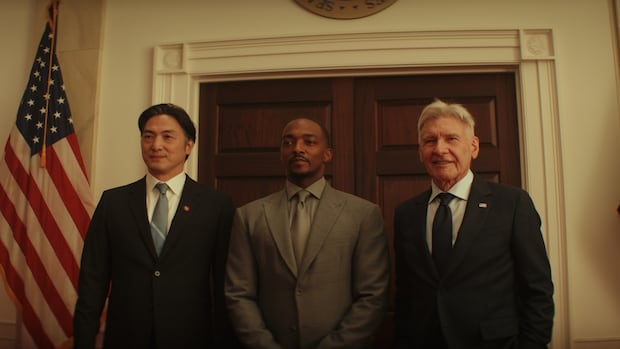Captain America: Brave New World was supposed to mark an exciting new chapter in the Marvel Cinematic Universe, with Anthony Mackie starring as the first Black Captain America.Â
But if you’ve seen even one headline reviewing the film, you’ll know that critics have been less than kind when talking about the film’s strengths and weaknesses.
Today on Commotion, podcaster Ashley Ray and film writers Adam Nayman and Kaiya Shunyata join host Elamin Abdelmahmoud to explain why the film is receiving such harsh reviews, and why it seemed doomed even before production completed.
We’ve included some highlights below, edited for length and clarity. For the full discussion, listen and follow Commotion with Elamin Abdelmahmoud on your favourite podcast player.
WATCH | Today’s episode on YouTube:Â
Elamin: Adam, you reviewed this movie for The Ringer. You were not gentle about it. You absolutely destroyed it. What are this movie’s biggest crimes against cinema?
Adam: I mean … the Marvel empire is built on quality control. I don’t know if they’ve been making art for a long time now. It’s kind of like an assembly line, and this feels like something where someone was kind of just asleep at the switch; it just fell on the factory floor and splintered, and then they swept it up and they put it back out.Â
It just feels like a broken movie, and the more that comes out about the degree to which it was reshot, all sorts of pressures and factors about which characters should it emphasize— you know, movies always get reworked and reshot, but this is kind of palpable, right? So there’s a lack of confidence, a lack of unity, a lack of purpose. There’s a line where the character played by Anthony Mackie is like, “I should have taken the serum,” which is a reference to not allowing himself to become a supersoldier, like the previous Captain America. And the movie feels like it forgot to take the serum…. When you watch that, given their reputation for quality control and how all this product is supposed to interlock and connect, that brokenness is palpable.
Elamin: Kaiya, at this point — what, 30-odd movies into the Marvel Cinematic Universe — there is a comfortable formula to this thing and the way that it works. One of the biggest successes of the Marvel machine is that they’ve developed this formula and they’re like, “OK, bring in a new character, throw it in and it’ll work.” … And then you get to a movie like this one. Even before the reviews started rolling out, all of the noise around this movie was like, something about this might be a little bit doomed. Do you want to talk about the obstacles that it took to get this movie even to the screen in the first place?
Kaiya: Yeah. It’s a shame because it shouldn’t be this hard, especially because they had a whole television series to set this up and then, like you said, 30-plus movies to also set this up. But it felt like when they announced the second round of reshoots, that’s when I was kind of like, “OK, this is going to be a hot mess.” It’s not like they don’t do reshoots, but it kept continuing. And then the date kept being pushed back. So it was clear that there was something going on behind the scenes, and you can tell when you watch the film.Â
It feels like it’s five movies mashed into one. This is a film where that shouldn’t be happening. Save that for an Avengers movie. This is a film that is supposed to be focusing on a singular character, yet there’s all these other things happening. It makes it feel so bloated, and it really shows, especially [in] that terrible CGI Hulk battle at the end— you guys wrote this in, like, five months ago, and this wasn’t originally how the film was supposed to end.
Elamin: I’ve got to say, Ashley, the reason I was excited about this is because we finally get one: a Black actor playing Captain America. That’s a big deal…. I’m wondering how Blackness is actually acknowledged in this movie. Is it a meaningful part of this film at all, that this is the first Black Captain America, or does that not feel sufficiently woven into the movie?
Ashley: It is not sufficiently woven into the movie. I don’t think anything is. There’s so much happening that I think the idea of his race, what it means for someone to say to him, “You’re not Steve Rogers,”… as a Black man, we will never know watching this movie because it’s just not there. It comes off very shallow, where it ends up feeling a bit like DEI, where it’s like, “We gave you a Black Captain America. What more do you need?”… when obviously there would be a lot that comes with being Black Captain America, and what it means to be a Black American who has to protect the president, and how conflicted you might feel about that. If he has any conflict over it, we don’t know. I did think Anthony Mackie was charming?
You can listen to the full discussion from today’s show on CBC Listen or on our podcast, Commotion with Elamin Abdelmahmoud, available wherever you get your podcasts.
Panel produced by Stuart Berman.
Source link : http://www.bing.com/news/apiclick.aspx?ref=FexRss&aid=&tid=67b50cf8567e4da1a95941422bbbbcc5&url=https%3A%2F%2Fwww.cbc.ca%2Farts%2Fcommotion%2Fcaptain-america-brave-new-world-is-a-mess-1.7461621&c=548784595396425903&mkt=en-us
Author :
Publish date : 2025-02-18 07:54:00
Copyright for syndicated content belongs to the linked Source.












